Report

Auf einen Blick
- Türkiye has work to do in meeting climate goals—but also has a developing economy to nurture, which has implications for its emissions profile.
- Meanwhile, the adjustment of global value chains to low-carbon operations provides an opportunity for Turkish industry.
- Well-rounded regulation could help lure low-carbon development and climate change adaptation investment.
- If Turkish industry can adapt to low-carbon value chains, this will bring in further investment, creating a virtuous circle.
Global leaders are set to gather at the COP28 climate talks in the United Arab Emirates amid growing concerns for the planet. The average temperature of the Earth has risen 1.1 degrees Celsius since 1880, with two-thirds of the warming happening since 1975.
Meanwhile, progress on meeting 2015 Paris Agreement climate goals has been slow. The COP27 climate talks held in 2022 delivered tangible progress but failed to provide substantial advances on issues such as adaptation and mitigation.
This paper, based on Bain analysis and interviews with Turkish business leaders, looks at how well Türkiye is placed to achieve its climate goals—and how decarbonization could be used as a lever for a competitive advantage.
A long journey, requiring bold decisions today
Türkiye is targeting a 41% cut in greenhouse gas emissions, compared to a business-as-usual scenario, by 2030. This should see the country’s emissions peaking in 2038. Much steeper cuts will be needed to get to net zero, which Türkiye aspires to do by 2053.
As is the case with many other countries, the path to achieving net zero is challenging, with research group Climate Action Tracker rating Türkiye’s policies and actions, domestic target, and “fair share” contribution to climate action as “critically insufficient.”
The country’s emissions saw a 3.1% CAGR between 1990 and 2021, jumping from 337 million metric tons of carbon dioxide equivalent (Mt CO2e) to 564 Mt CO2e between 2005 and 2021 alone.
A massive 70% of the increase was mainly due to emissions related to energy consumption, as emissions stem from coal-fired electricity remains a significant issue. Emissions from coal-fired electricity output topped 44 million tons of carbon dioxide and equivalent gases in the first half of 2023, representing a new half-year high.
Emissions are forecast to continue rising, despite the nation’s NDC pledge, as Türkiye ramps up energy generation capacity to fuel industrial growth.
Türkiye’s reliance on coal gives it more in common with developing nations than with the mature economies of its European peer group, which, thanks to more staid economic growth, can meet a higher proportion of rising energy demand through renewables.
When the Paris Agreement entered into force in November 2016, Türkiye’s emissions per GDP, based on purchasing power parity, were aligned with the mature economies of its European peer group, yet it had a very different point of departure considering its rapidly growing economy.
Hence it is unsurprising that the European Union (EU) has been able to boast average negative CAGRs for emissions between 1990 and 2021, while those of Türkiye have risen.
Türkiye’s developing economy continues to pose a challenge for decarbonization—but could also serve as an opportunity to leapfrog. For mature economies, decarbonization usually means reinvestment and adaptation, while developing economies can speed ahead by designing new systems.
For now, Türkiye continues to value economic development over sustainability.
This is clear from the actions of the administration, which has yet to prepare an exit plan for coal, and the private sector, where only 75 companies—representing an estimated 15% of national emissions—reported carbon footprints through CDP in 2021.
Yet the country also has motives to increase its climate ambition, with 50 years of rising average temperatures culminating in a new 50 degrees Celsius record in 2023. Experts warn such temperatures could soon happen up to a dozen times a year.
And there are reasons for optimism despite the bleak outlook. Although coal remains a significant part of its grid and investments in coal-fired power are ongoing, Türkiye’s National Energy Plan commits to increasing wind capacity 179% and solar 578% by 2035, compared to 2021 levels.
Overall emissions intensity in the power sector declined by 10.6% between 2016 and 2021, primarily due to the large year-on-year increase in renewable energy generation, which was faster than the 8.1% decline in the G20 average.
These achievements are a cause for cheer among industrial leaders.
“Navigating a pathway to a green economy in a period of high inflation and economic uncertainty is a difficult task, but it can be perceived as a golden opportunity to realign national priorities and stimulate innovation and resilience,” says a senior executive interviewed for this report.
“As Türkiye eyes the lofty goal of achieving net-zero emissions by 2053, the journey must be marked by a shared nationwide vision that rests on a broad democratic foundation,” he adds. “This approach is not merely a philosophical stance but is grounded in a strategic, economic rationale.”
Export worries: “The optimist sees opportunity in every difficulty”
Much of this rationale relates to the wider geopolitical environment. Türkiye’s three largest export markets—Germany, the US, and the UK, which together represented more than a fifth of all exports in 2021—are all pursuing more aggressive decarbonization policies than Türkiye is.
A new Carbon Border Adjustment Mechanism (CBAM) will soon force EU importers to factor European Emissions Trading System (ETS) pricing into their products.
This will force importers to declare the emissions associated with imports—and account for them with CBAM certificates, priced on weekly ETS allowances.
If carbon costs have already been covered, for example through a valid certification scheme, then the amount can be deducted from the cost of the CBAM certificate.
In a transitional phase, up to December 2025, importers will only have to declare their emissions on a quarterly basis, with no need to provide verification of their data or purchase CBAM certificates—although penalties will be applied to companies that fail to provide reports.
CBAM will likely force all major exporters worldwide to improve carbon reporting and could lead to a domino effect as non-EU markets implement similar climate-related trading arrangements.
CBAM and broader regulations will require a reshuffle of the value chain and new business models.
To adapt to this new reality, Türkiye’s private sector will need to improve its emissions reporting and ultimately reduce the carbon intensity of its operations, requiring additional commitment and potential costs.
However, if Turkish companies implement such changes quickly then they could turn this challenge into an opportunity, stealing a lead on suppliers from other markets and gaining a privileged position in critical supply chains to Europe and other Western markets.
The importance of this shift should not be underestimated. The EU’s push for lower emissions is highly disruptive, favoring new entrants.
Traditional export giants may find it hard to meet the EU’s requirements for low-carbon-intensity products, giving Turkish players space to push into European value chains—provided those players can move fast in addressing their own carbon footprints.
This should not be viewed as a cost, but an opportunity. If there is shortage of suppliers, EU players might be willing to pay a premium in order to get to a cleaner and more transparent supply chain providing sustainable products and services. In the automotive sector, this premium is estimated to be around 7%.
In the lithium-ion battery sector, supply is unlikely to meet demand even in a best-case scenario. Specialist market research firm RK Equity reports a “structural shortage” of lithium, and the European Court of Auditors says EU battery manufacturers will face an impending shortage of raw materials from 2030. This could leave European carmakers scrambling for imports, opening doors for Turkish supply chain partners.
Taking the temperature of Türkiye’s business community
To understand how Türkiye’s private sector views the challenges and opportunities linked to climate change, Bain & Company combined original analysis with executive interviews covering roughly 20 Turkish company executives.
The interviews, which included CEOs and other board-level leaders, addressed questions such as whether Türkiye will be able to meet its net-zero target, what efforts are in place to enable decarbonization, and what roadblocks exist.
The five messages that emerged from this consultation were as follows:
- Türkiye can meet its net zero target. But it must step up efforts now, with companies sharing more data on emissions, ditching short-term views, and helping their business ecosystems to run rather than walk toward a low-carbon future.
- Supply chains need practical support—as well as leadership—for decarbonization. Seven out of ten companies interviewed are helping business partners cut emissions, but around a third are finding it hard to convince cash-strapped suppliers of the need for change.
- More transparency around emissions is a must. Only 10% of the companies surveyed have embedded internal carbon pricing into business processes and 90% say calculating emissions is an issue.
- Climate-related funding is a universal challenge that needs a clear view of policy direction. Leaders said they needed more incentives for decarbonization, plus standards so they know where to aim investments.
- Climate-related capital allocation is spreading from decarbonization to adaptation. But there is still a need to view these activities as being complementary rather than a trade-off.
Here is a detailed view of each of these points.
The need to step up
Despite a business-as-usual forecast of 1,175 Mt CO2e by 2030, 9 out of 10 executives consulted by Bain said they believed Türkiye would achieve its net zero target—provided there was a concerted effort to do so in the coming years.
Questions over the feasibility of hitting decarbonization targets are not limited to Türkiye. One of the biggest challenges facing all leaders at COP28 will be to demonstrate that their net zero plans are credible.
The national targets that have been declared so far cover around 88% of worldwide emissions, yet almost three out of four goals are deemed inadequate by Climate Action Tracker (see Figure 1).
For Türkiye, the credibility gap is acute—first because of the country’s appetite for fossil fuels to power economic growth, and second because of a paucity of existing data on emissions.
These emissions are not expected to peak for 15 years, creating the need for a steep decline to reach targets after 2038.
The private sector will have to step up, given that only 22 Turkish companies in 2021 had a net-zero target, and just 21 had goals aligned with the Science Based Targets initiative (SBTi) to keep global warming to 1.5 degrees Celsius of preindustrial levels (see Figure 2).
Only 15% of Scope 1 and 2 emissions in Türkiye are reported through CDP

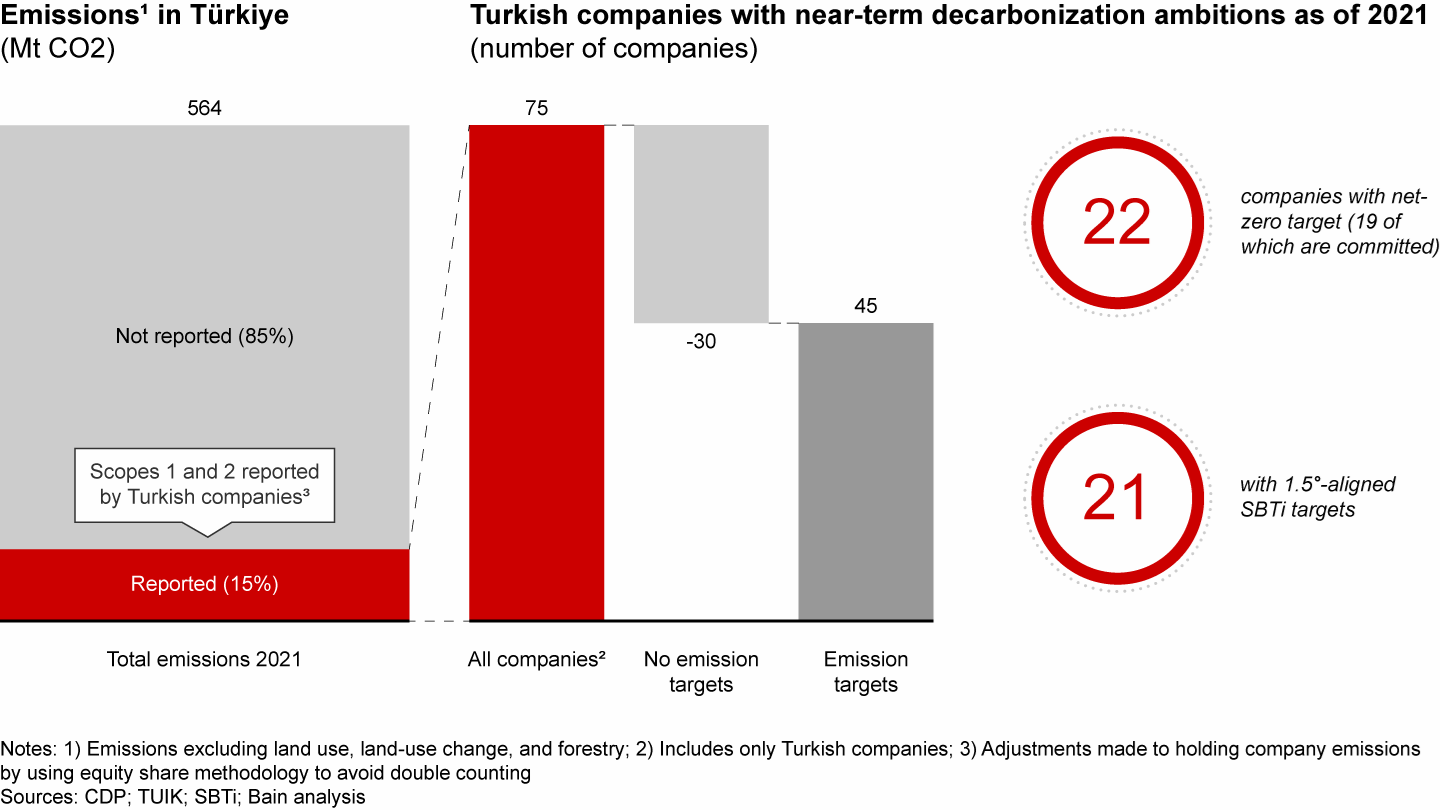
It is hard to see companies taking greater care over such matters while economic stability and growth remain prime objectives and new finance minister Mehmet Şimşek seeks to tame inflation that topped 61% in September 2023.
Yet there are signs Türkiye is seeking to achieve its economic aims in a more sustainable way. In 2021, the administration set out a Green Deal Action Plan with 32 objectives and 81 actions designed to address global climate change policies and attract foreign investment.
And Türkiye is readying a Green Growth Technology Roadmap to support technologies that can increase the level of sustainable production in industry, with a focus on aluminum, cement, chemicals, fertilizers, iron and steel, and plastics—most of which are sectors affected by the CBAM.
Furthermore, a range of technological levers are available to help decarbonize Türkiye’s private and public sectors. In power generation, for example, it would be relatively easy to accelerate the deployment of renewable energy sources.
Similarly, civil engineering and construction could benefit from improvements in energy efficiency and increased electrification of end-user demand. Industrial processes could benefit from energy efficiency initiatives and also adopt clean hydrogen as a fuel for emissions-intensive industries.
Türkiye’s experience with renewable energy has shown how government incentives can foster rapid decarbonization. There is no reason why further incentive schemes could not be used effectively to stimulate the adoption of low-carbon technologies elsewhere.
However, Bain research has found organizations are still afraid to embrace decarbonization, with little appetite for sharing data and a short-term vision of the benefits of sustainability.
To overcome this, private sector leaders will need to strongly support industrial ecosystems, sharing knowledge to help supply chain partners and other ecosystem players seize the benefits of lower-carbon operations.
Companies will need to share more data on emissions, giving Turkish supply chains the tools they need to address export market opportunities created by CBAM and similar regulations elsewhere.
Finally, Turkish industry needs to see decarbonization as a marathon rather than a sprint.
Today’s investments may be adequate for short-term growth, but the real prize will be for leaders that have the vision to invest in low-carbon operations for the long term, building on recent successes.
“Türkiye has recently gained notable momentum toward achieving net zero, especially following the release of the Green Deal,” says one of the leaders interviewed.
“Türkiye displayed significant ambition during COP27, establishing targets such as a 41% reduction in emissions by 2030, despite still being categorized as a low performer with its efforts deemed critically insufficient by the Action Tracker,” she says.
However, she adds: “To achieve the target, there is a need for collective effort across different sectors. Collaboration must be encouraged among corporates, financial institutions, government, and development banks.”
Active support is required
That collaboration is happening, with two-thirds of leaders in the research saying they had started to engage with their supplier ecosystems on meeting carbon targets. But more needs to be done.
A third of the sample noted that it is still difficult to convince business-to-business suppliers of the need to prioritize climate issues in their corporate strategies. This is evident in the lackluster level and quality of emissions reporting and net zero target setting among Turkish companies.
The few businesses that are measuring their carbon footprints are only focusing on so-called Scope 1 and 2 emissions—those arising from their operations and the energy they buy.
The companies are still far off quantifying Scope 3 emissions, which encompass all the greenhouse gases produced by their supply chains and the use of their products—and can add up to more than 70% of their total carbon footprint (see Figure 3).
Catalyzation should focus on supply chain

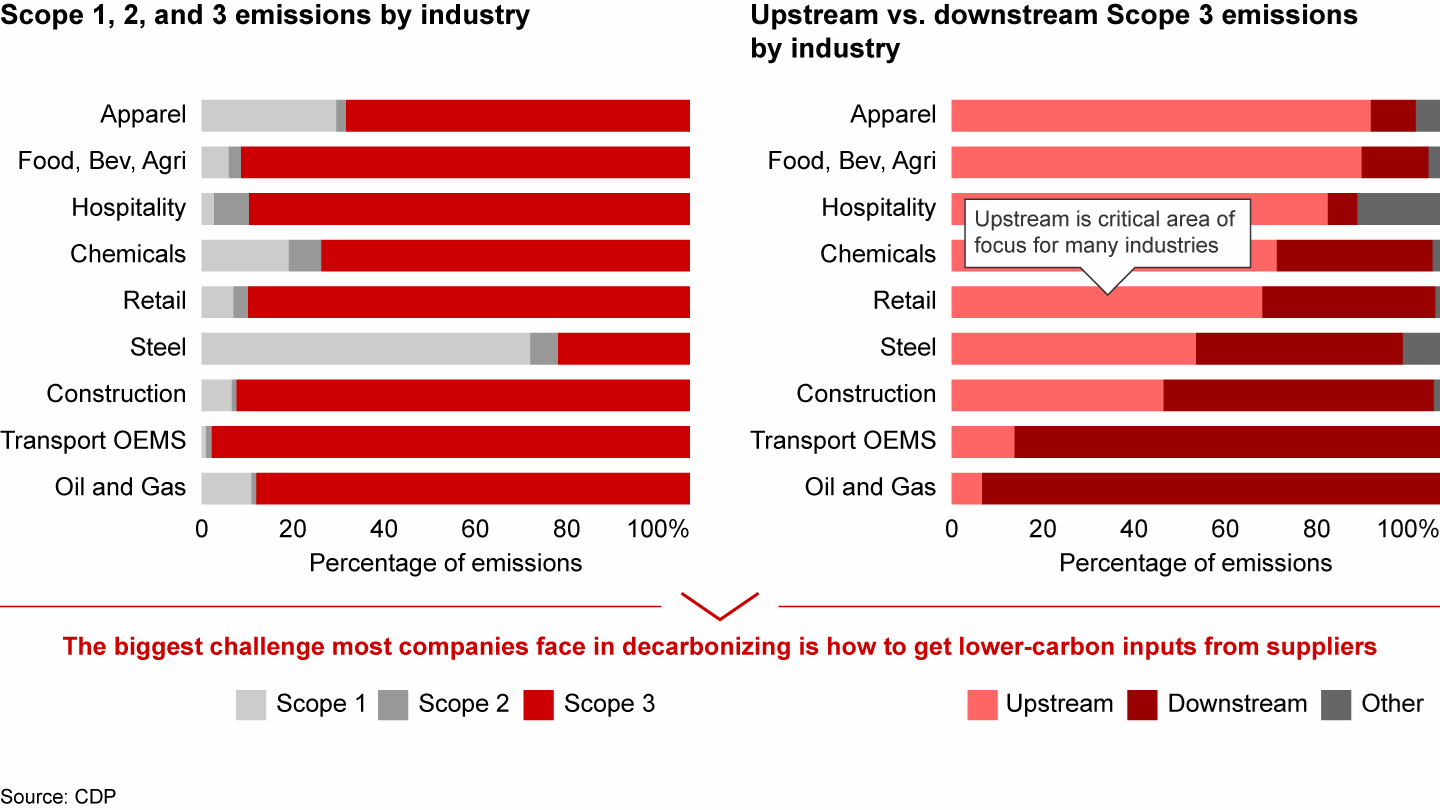
Tightening the focus on Scope 3 could have a transformative effect on Turkish industry, forcing entire supply chains to measure, report, and reduce their carbon emissions.
This will require access to funding and knowledge, as well as regulatory guidance.
Many small-to-medium enterprises (SMEs) lack funding to invest in decarbonization programs, so an important part of the support that leading organizations can offer is in sharing knowledge of value creation and financial resources in the journey to low-carbon operations.
“Many companies, especially SMEs, are not fully aware of the importance of measuring and disclosing emissions or setting science-based targets,” says a top executive of a Turkish conglomerate.
“Climate change mitigation is not a priority for them, and they lack information about the benefits of such actions.”
Furthermore, she says, “Companies lack the financial and human resources necessary to conduct emissions assessments, report data to platforms like CDP, or develop and implement comprehensive emissions reduction plans. These efforts can require dedicated staff and expertise.”
Without knowledge of the wider context, SMEs are likely to view emissions reporting as an unnecessary burden rather than a key to unlock new export opportunities. Hence, knowledge sharing will play a key role in fostering the shift to low-carbon operations.
Transparency will be key
Türkiye’s private sector may also struggle to reduce emissions because companies lack the means to implement decarbonization strategies without funding and clear regulations.
Carbon reductions are poorly integrated into organizational targets, with only 1 in 10 of the leaders consulted by Bain saying their companies had been able to embed internal carbon pricing into their operations.
A majority of the companies said they were still finding it difficult to calculate their emissions footprints, particularly those in Scope 3. However, a leader at a major Turkish industrial concern believes global pressures will change this situation. “CBAM is critical,” he says.
“If you are exporting to Europe, you cannot run away from this,” he adds. “You must report emissions [to] get the proper accredited certification.”
Furthermore, sector-specific levers will only work if it is possible to measure current footprints and see the benefits of each lever. Behind each lever is an investment that companies need to sustain, and banks need to finance, so clarity on the carbon and financial impact is fundamental.
Generally, these levers can be grouped into three categories:
- Clean energy provision, through electrification, clean hydrogen, and so on
- Circularity and the reuse of previously used material—provided recycling processes do not involve increased emissions
- Sustainable design to facilitate the reduction of materials with high emissions
Several industries in Türkiye can benefit from green initiatives. Türkiye’s steel industry is one example that could profit from reporting transparency and decarbonization levers.
Turkish steelmakers have excess capacity, particularly in electric arc furnaces with lower emissions than basic oxygen furnaces. Without strong financial incentives, this makes it challenging to further invest in capacity increases and technology for green steel.
Yet as one of the largest steel manufacturers in the world, if Türkiye can link green steel investments to higher climate ambitions—and if emissions from manufacturing are reduced—then Europe could remain an important export market for the industry (see Figure 4).
Turkish steel industry shows an increasing trend in production and capacity, while top players expand their capacities and productions sustainability efforts remain limited

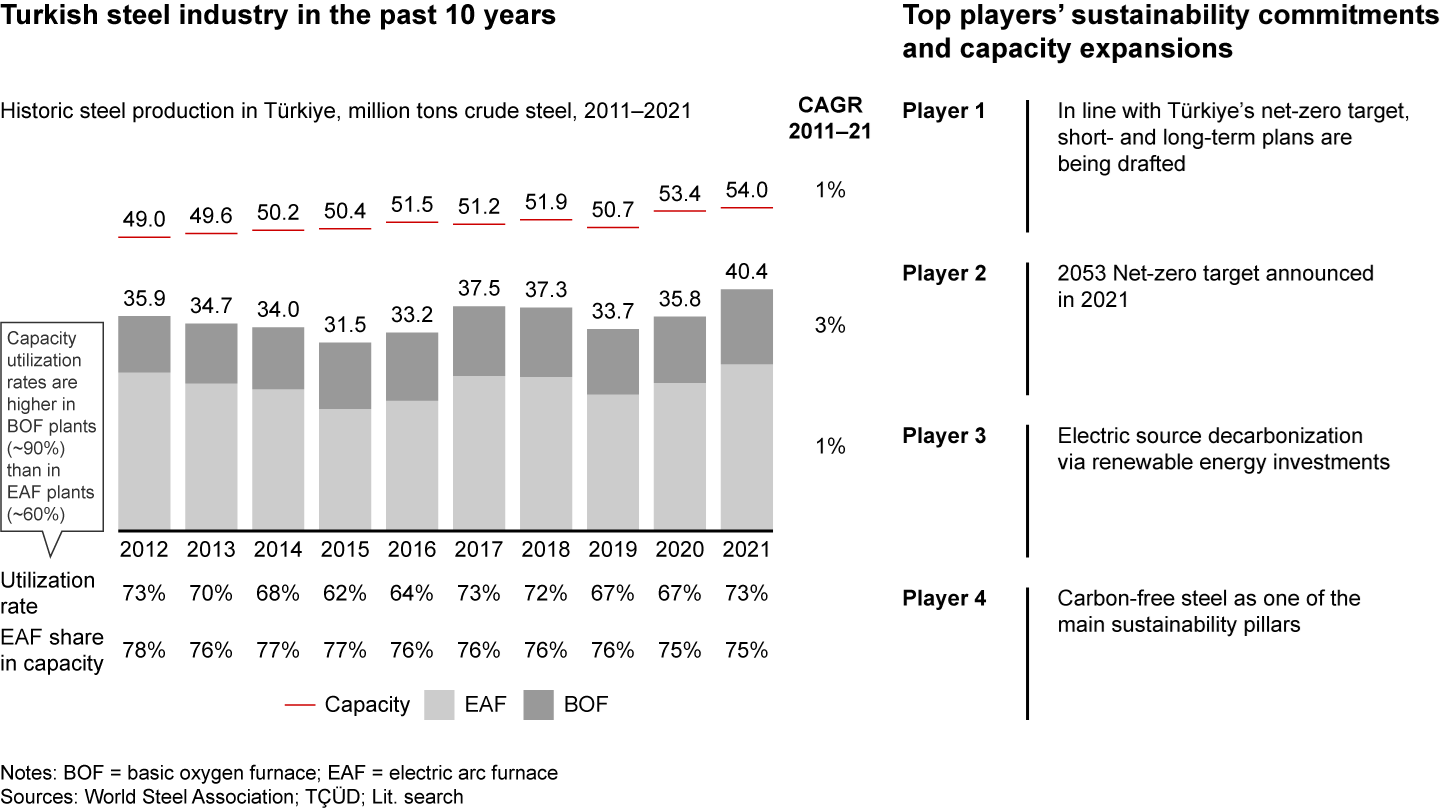
Automotive manufacturers are another important example. Original equipment manufacturers (OEMs) and their suppliers can use multiple levers to create opportunities. On top of decarbonization levers such as clean energy, automotive OEMs can increase their focus on circularity, as with plastics. Global OEMs have already started embedding recycled and bioplastics into their vehicles.
Clearly, decarbonization levers and increased circularity come with increased costs in the near term. Embedding sustainability into design will help reduce such costs and further increase decarbonization efforts.
The three types of levers discussed would eliminate the lion’s share of emissions, from Türkiye’s private sector. But increased investments in carbon capture and storage will also be needed to remove excess emissions and ensure a steady path toward net zero.
Funding needs direction
Decarbonization will not happen for free. The International Renewable Energy Agency’s World Energy Transitions Outlook 2023 Preview warns of the need for $35 trillion in global investment by 2030 to enable the energy transition.
In Türkiye, though, such investments are expected to yield net gains, largely due to reduced fuel imports and health benefits from decreasing air pollution. World Bank estimates show a spend of $165 billion (where half of the investments are expected to come from the private sector) up to 2040 could yield net savings of around $150 billion (see Figure 5).
$165 billion in decarbonization investments could lead to $150 billion in net savings through 2040

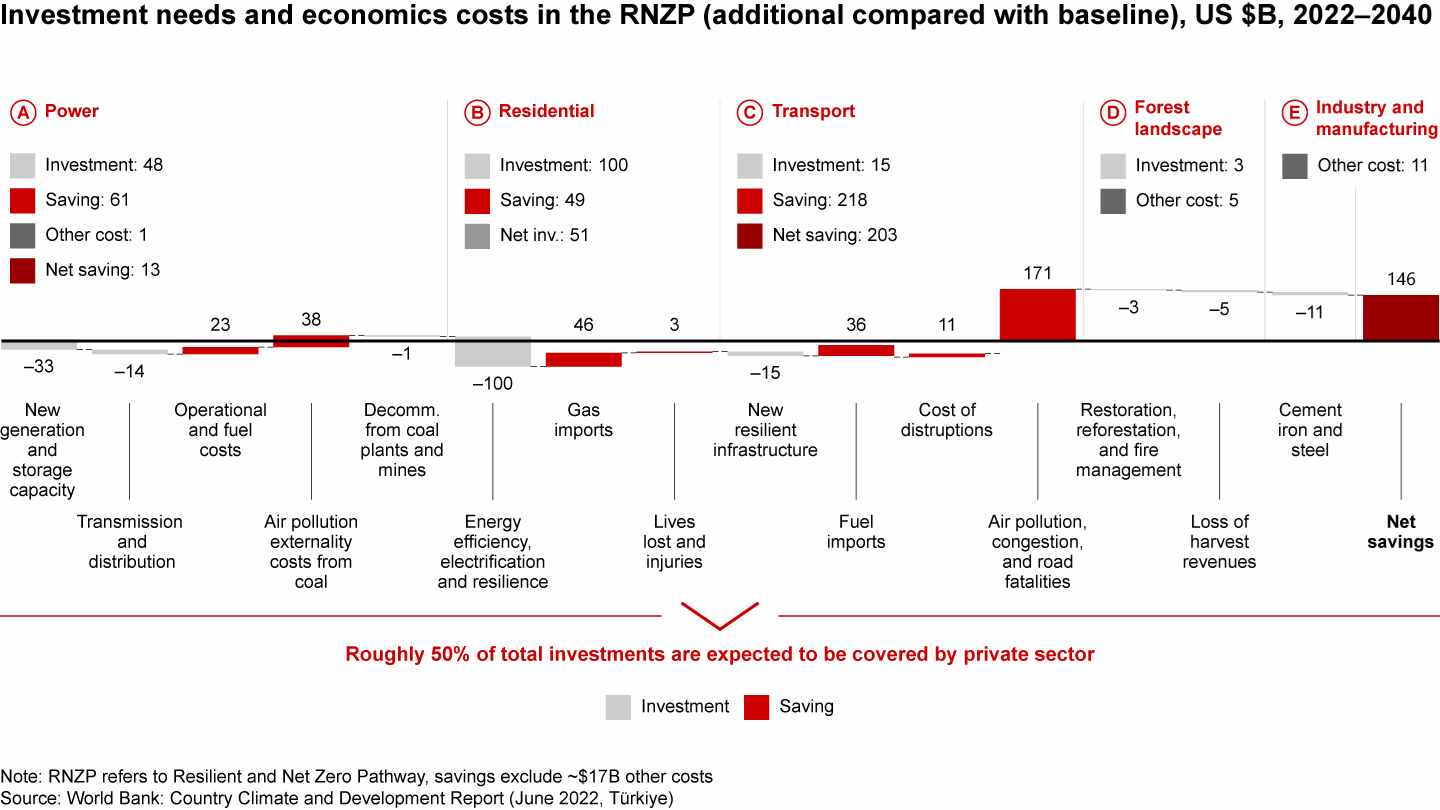
All the leaders interviewed by Bain said lack of funding was the main challenge in achieving decarbonization goals. Financial incentives are seen as vital in helping companies realize tangible benefits while reducing emissions.
“Transformation requires capital,” says a senior Turkish fund manager. “Green funding schemes are necessary.”
Access to finance is seen as a necessary but not sufficient factor in decarbonization, however. Investors require clear, stable regulatory regimes before reaching for their checkbooks, so having clarity on Türkiye’s direction of travel on decarbonization will be key to unlocking finance.
“It’s essential to continually assess the evolving landscape of green energy and consider creating or modifying funds and initiatives to address emerging needs and opportunities in the renewable energy and sustainability sectors,” says the CEO of a major industrial group in Türkiye.
“Renewable energy infrastructure, energy storage investments, green hydrogen, carbon capture and storage, circular economy, and impact investments are some areas that need incentive programs,” she adds.
“We expect the Ministry of Technology and Industry and TÜBİTAK [The Scientific and Technological Research Institution of Türkiye] to announce incentive programs for Turkish industry soon.”
Green financing is one of the nine categories covered in Türkiye’s 2021 Green Deal Action Plan, and the country has set up a working group to consult with the private sector and other stakeholders on implementing the plan.
However, funding will need to go hand in hand with clear regulation—ideally aimed at attracting foreign capital and turning a challenge into an opportunity. In this respect, Türkiye could also be releasing ETS-based financial reporting standards in the near future.
It’s not just about decarbonization
While there is an urgent need to step up investment in decarbonization, it is also becoming clear that companies must allocate capital to climate adaptation.
Türkiye has already seen temperatures topping 50 degrees Celsius, and experts warn this could happen up to a dozen times a year in future. Around 25% of the country is viewed as being at a high risk from climate change, a figure that is expected to rise to 40% by 2050 (see Figure 6).
Around 25% of Türkiye is considered to be at high risk of extreme climate events, increasing to 40% by 2050


This means that by the mid-century, up to around 35 million Turkish citizens could be living in areas with a high risk of weather-related threats such as heat waves, heavy rainfall, and droughts.
Turkish companies are waking up to this fact, with most of the leaders interviewed saying the focus of their climate target investments went beyond decarbonization, and many stating that they were planning wider strategic spending.
“It goes without saying that changing hydrology impacts our hydropower plants significantly,” says one of the CEOs. “In the past, our companies worked on scenarios to understand the impact of changing climate on their businesses,” he says.
But this year, he adds, “A variety of our group companies are working on their updated climate scenarios according to less-than-2-degrees-Celsius and 3.5-to-4-degrees-Celsius scenarios.”
Adaptation “is not only limited to adapting your physical infrastructure to the changing climate,” says the CEO, but “also about keeping up with the changing technological, competitive, [and] regulation landscape, as well as closing the skills gap.”
This view is not unique. Most companies have already started allocating part of their capital expenditure to adaptation initiatives, and banks are willing to fund such moves.
A message from the research is that such investments should be seen as complementary to decarbonization, rather than a “plan B” for if the transition to low-carbon operations does not work.
A decisive decade
Türkiye faces a decisive decade as it seeks to drive economic growth while adapting to a low-carbon world. Ahead of it lies an immense opportunity as its main trading partners in Europe and North America seek to decarbonize their supply chains.
As things stand, Türkiye’s path to net-zero emissions is extremely challenging—yet still viewed as feasible with the right government incentives. Indeed, regulation will play a key role in ensuring Turkish businesses can align with the interests of European and North American customers.
Grasping this opportunity will not be about government policy alone, however. The private sector will need to clearly articulate what it needs from the administration—and will have to take the initiative in creating more sustainable business ecosystems.
Turkish companies must waste no time in carrying out the following actions (see Figure 7):
- Improving the data transparency around emissions reduction, particularly in calculating and reporting carbon footprints—including Scope 3.
- Setting verified, science-based near- and long-term decarbonization targets, backed by actionable execution plans, and cascading these through supply chains.
- Embedding environmental, social, and governance criteria into corporate strategy, from investment planning to day-to-day decision making. And extending investments beyond decarbonization and into climate adaptation, in a holistic way.
- Beefing up knowledge sharing and proactively engaging stakeholders throughout the decarbonization journey, with an emphasis on supply chain partners that might not have the resources to meet targets on their own.
- Investing in net zero industrial technology production capacity to meet global market demand for lower-carbon products and services, especially in areas where decarbonization is creating new supply chain opportunities.
Through interviews with Turkish business leaders, we identified nine pragmatic calls to action to accelerate Türkiye’s climate transition

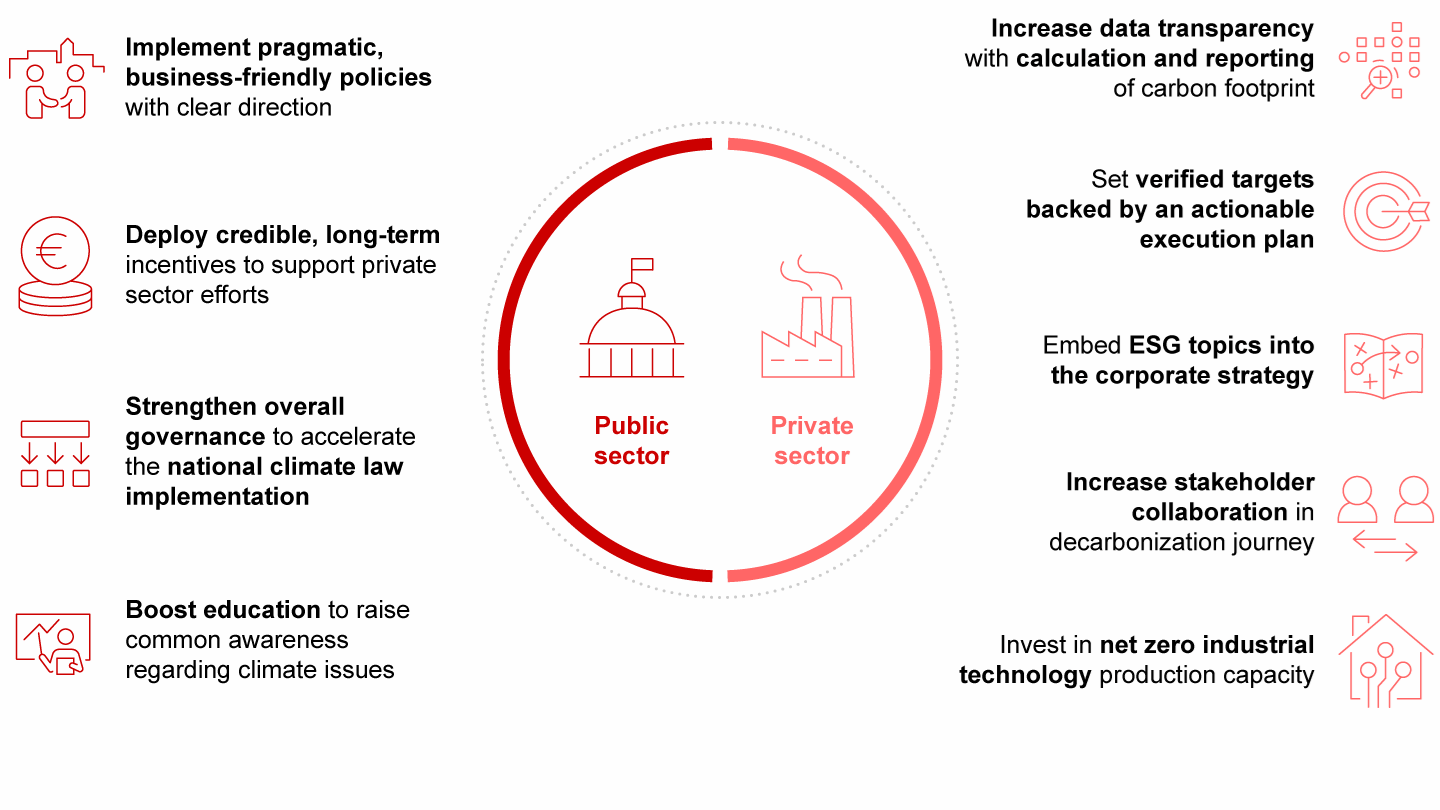
To achieve net zero emissions, “Türkiye should focus on the energy transition” because of the extent to which the country’s carbon footprint is related to coal-fired generation, says one of the leaders interviewed.
Already, he says, “There is a success story in Turkish renewables, with huge investments. There would be much more carbon emissions otherwise. [But] we have to do a lot more. Currently, more than 60% of the power mix comes from non-renewables. These should be converted.”
And according to the CEO of a large manufacturer, “Markets will determine who is going to be around in 10 to 15 years. Governments need to support the process because most businesses are not aware of this. They need to regulate and incentivize companies to decarbonize.”
Talk of incentives naturally leads to questions about where the money will come from, a pressing issue in a country that in October 2023 saw the fifth interest rate rise in five months, along with a steep drop in stock market values.
However, if the right regulations and capabilities are put in place, then there will be all the elements to attract foreign investment. The world is awash with capital seeking a sustainable future, and with the right moves it could find a welcome home in Türkiye.